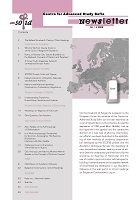
CAS Newsletter 2006 / No 2
Articles, pictures and interviews can be reprinted only with the consent of Centre for Advanced Study Sofia (CAS - Sofia). Any citations should be duly acknowledged.
More...We kindly inform you that, as long as the subject affiliation of our 300.000+ articles is in progress, you might get unsufficient or no results on your third level or second level search. In this case, please broaden your search criteria.

Articles, pictures and interviews can be reprinted only with the consent of Centre for Advanced Study Sofia (CAS - Sofia). Any citations should be duly acknowledged.
More...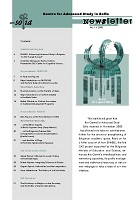
Articles, pictures and interviews can be reprinted only with the consent of Centre for Advanced Study Sofia (CAS - Sofia). Any citations should be duly acknowledged.
More...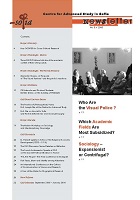
Articles, pictures and interviews can be reprinted only with the consent of Centre for Advanced Study Sofia (CAS - Sofia). Any citations should be duly acknowledged.
More...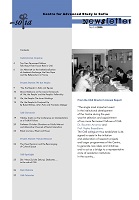
Articles, pictures and interviews can be reprinted only with the consent of Centre for Advanced Study Sofia (CAS - Sofia). Any citations should be duly acknowledged.
More...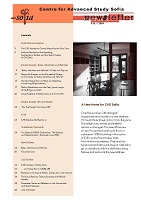
Articles, pictures and interviews can be reprinted only with the consent of Centre for Advanced Study Sofia (CAS - Sofia). Any citations should be duly acknowledged.
More...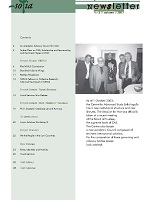
Articles, pictures and interviews can be reprinted only with the consent of Centre for Advanced Study Sofia (CAS - Sofia). Any citations should be duly acknowledged.
More...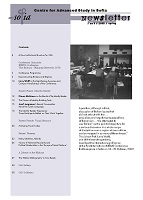
Articles, pictures and interviews can be reprinted only with the consent of Centre for Advanced Study Sofia (CAS - Sofia). Any citations should be duly acknowledged.
More...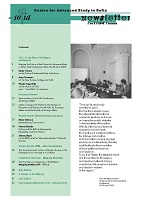
Articles, pictures and interviews can be reprinted only with the consent of Centre for Advanced Study Sofia (CAS - Sofia). Any citations should be duly acknowledged.
More...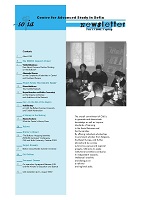
Articles, pictures and interviews can be reprinted only with the consent of Centre for Advanced Study Sofia (CAS - Sofia). Any citations should be duly acknowledged.
More...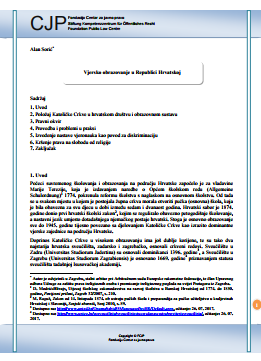
This paper investigates issues relating to religious education in public school system in the Republic of Croatia. It focuses mainly on Catholic Catechism in public school, due to the fact that population of Croatia is predominantly Catholic and the fact that Croatia has entered into international accords with Holy See. Paper particularly analyzes and describes instances of discrimination of nonreligious school children and criticizes the fact that no alternative education is provided to such children, at least in the first three grades of elementary schools. Finally, the paper offers certain recommendations to mitigate existing problems and to eliminate discrimination from public school system of the Republic of Croatia.
More...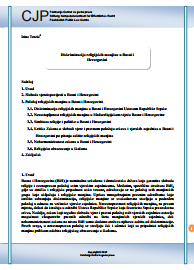
Isprepletenost i podudarnost etničke i religijske pripadnosti u BiH direktno se odražava na položaj religijskih manjina u BiH. Zbog takve karakteristične strukture, gdje se svi napori usmjeravaju ka pružanju jednakog tretmana trima većinskim religijama, prava religijskih manjina ostaju zapostavljena. Iako su na snazi mnogi pravni propisi koji garantiraju jednak položaj svih religijskih zajednica, religijske manjine se svakodnevno stavljaju u obespravljen položaj. To je na primjer vidljivo iz činjenica da Ustav Republike Srpske navodi Srpsku pravoslavnu crkvu kao crkvu srpskog naroda i drugih naroda pravoslavne vjere, te da religijske manjine nisu zastupljene u Međureligijskom vijeću BiH. Pored toga, obespravljenost religijskih manjina dolazi do izražaja i u koncepciji religijskog obrazovanja u školama, gdje u većini slučajeva učenici nisu u mogućnosti da pohađaju religijsko obrazovanje po svom izboru, nego zbog konretnih okolnosti moraju konzumirati vjersku pouku većinske religije. Problemi sa legislativom u BiH, kao što su neharmoniziranost te siromašna zakonska zaštita od diskriminacije, samo dodatno doprinose marginalizaciji religijskih manjina u društvu. Zbog pojedinih Ustavnih odredbi koje omogućuju povlašteni položaj određenoj religiji i uske povezanosti religije i politike, BiH sve više postaje polusekularna država, u kojoj se za vođstvo takmiče tri većinske religije. Iz svega navedenog slijedi da bi vlasti BiH trebale poduzeti različite mjere kako bi se religijske manjine zaštitile od diskriminacije. Prvi korak bi predstavljalo ukidanje odredbe Ustava Republike Srpske, kojom se daje povlašteni položaj Srpskoj pravoslavnoj crkvi. Dalje, religijske manjine treba da budu zastupljene u organima Međureligijskog vijeća u BiH. Aktivnim djelovanjem Međureligijskog vijeća bi se mogao znatno poboljšati položaj religijskih manjina u društvu. Pored toga, vlasti BiH bi trebale poduzeti korake kako bi harmonizirale i ojačale zakone vezane za zaštitu od krivičnog djela poticanja na mržnju. Iako krivična djela počinjena iz mržnje prema religijskim manjinama nisu česta pojava u BiH, ipak stručnjaci za ljudska prava ukazuju na njihovo postojanje. Stoga bi harmonizacija zakonodavstva znatno olakšala sudijama i tužiocima sankcioniranje krivičnog djela poticanje na mržnju, što bi opt doprinijelo ujednačavanju sudske prakse, a time i efektivnijoj zaštiti i prevenciji od sličnih krivičnih djela. Na posljetku, jedna od ključnih stvari za uklanjanje diskriminacije religijskih manjina u BiH jeste izmjena dosadašnjeg načina religijskog obrazovanja u školama. Umjesto vjerske pouke o samo jednoj religiji, učenici treba da se educiraju o različitim kulturama i religijama. Kao što je predhodno navedeno, zbog okolnosti, škole su ograničene u pogledu pružanja vrste religijskog obrazovanja, tako da bi ovakva opcija bila prikladna za učenike svih vjeroispovijesti, kod kojih bi se ujedno i razvijala svijest o važnosti tolerancije i ravnopravnosti u društvu.
More...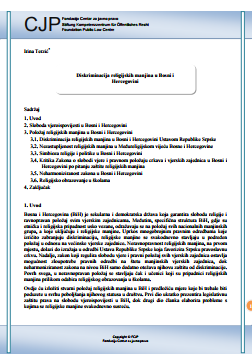
Isprepletenost etničke i religijske pripadnosti u BiH se direktno odražava na položaj religijskih manjina u BiH. Zbog takve karakteristične strukture, gdje se svi napori usmjeravaju ka pružanju jednakog tretmana trima većinskim religijama, prava religijskih manjina ostaju zapostavljena. Iako su na snazi mnogi pravni propisi koji garantiraju jednak položaj svih religijskih zajednica, religijske manjine se svakodnevno stavljaju u obespravljen položaj. Na primjer, to je vidljivo iz činjenica da Ustav Republike Srpske navodi Srpsku pravoslavnu crkvu kao crkvu srpskog naroda i drugih naroda pravoslavne vjere, te da religijske manjine nisu zastupljene u Međureligijskom vijeću BiH. Pored toga, obespravljenost religijskih manjina dolazi do izražaja prilikom religijskog obrazovanja u školama, gdje u većini slučajeva učenici nisu u mogućnosti da pohađaju religijsko obrazovanje po svom izboru, nego zbog okolnosti pristaju na vjersku pouku većinske religije. Problemi sa legislativom u BiH, kao što su neharmoniziranost, te siromašna zakonska zaštita od diskriminacije, samo dodatno doprinose marginalizaciji religijskih manjina u društvu. Zbog pojedinih ustavnih odredbi, gdje se povlašteni položaj daje određenoj religiji, te uske povezanosti religije i politike, BiH sve više daje utisak polusekularne države, u kojoj se za vođstvo takmiče tri većinske religije. Iz svega navedenog je očito da bi vlasti BiH trebale poduzeti različite mjere kako bi religijske manjine zaštitile od diskriminacije. Prvi korak ka tome je ukinuti odredbu Ustava Republike Srpske, kojom se daje povlašteni položaj Srpskoj pravoslavnoj crkvi. Dalje, religijske manjine treba da budu zastupljene u organima Međureligijskog vijeća u BiH. Aktivnim djelovanjem Međureligijskog vijeća mogao bi se znatno poboljšati položaj religijskih manjina u društvu. Pored toga, vlasti BiH bi trebale poduzeti korake kako bi harmonizirali i ojačali zakone vezane za zaštitu od krivičnog djela poticanja na mržnju. Iako krivična djela počinjena iz mržnje prema religijskim manjinama nisu česta pojava u BiH, ipak stručnjaci za ljudska prava su ukazali na njihovo postojanje. Stoga, harmonizacija zakonodavstva bi znatno olakšala sudijama i tužiocima sankcioniranje krivičnog djela poticanje na mržnju, što bi doprinijelo konzinstentnosti sudske prakse, a time i efektivnijoj zaštiti i prevenciji od sličnih zločina. Naposljetku, jedna od ključnih stvari za uklanjanje diskriminacije religijskih manjina u BiH jeste izmjena dosadašnjeg načina religijskog obrazovanja u školama. Umjesto vjerske pouke o samo jednoj vrsti religije, učenici treba da se educiraju o različitim kulturama i religijama. Kao što je prethodno navedeno, zbog okolnosti, škole su ograničene u pogledu pružanja vrste religijskog obrazovanja, tako da bi ovakva opcija bila prikladna za učenike svih vjeroispovijesti, kod kojih bi se ujedno i razvijala svijest o važnosti tolerancije i ravnopravnosti u društvu.
More...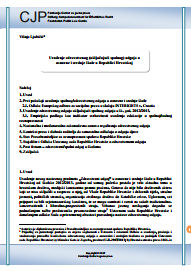
The author analyzes the introduction of health education, including sex education, into the system of compulsory primary and secondary education in the Republic of Croatia, from the first initiative of the late 90s to the present time. The author writes about public controversy between traditionally conservative and liberally progressive social forces regarding the right of parents, who hold certain world views to make independent decisions about the education of children, and, on the other hand, the constitutional obligation of the State to ensure children's right to a full and harmonious development of their personalities. The issue is addressed from the perspective of the case law of the European Court of Human Rights, which has already dealt with this issue, and the decision of the Constitutional Court of the Republic of Croatia, which emphasizes the importance of democratic, pluralistic approach in the creation of educational contents, especially when it comes to sexual education of children. How to put an end to the controversy, whose intent is to dispute the school's program of sex education on the basis of religious and/or political beliefs, still is an open question.
More...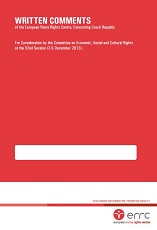
The European Roma Rights Centre (ERRC) hereby submits this report to the United Nations Human Rights Council (HRC) for the universal periodic review of France’s compliance with its human rights commitments. This report focuses on housing, forced evictions, access to water and sanitation.
More...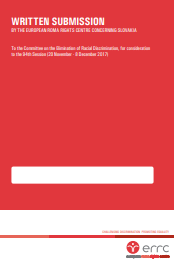
The European Roma Rights Centre (ERRC) is a Roma-led international public interest law organisation which monitors the human rights of Roma in Europe and provides legal defence in cases of human rights violations. The ERRC is deeply concerned at the lack of progress made by Bulgarian authorities since CERD issued its concluding observations on Bulgaria in 2009 with specific reference to the committee’s recommendations concerning the situation of Roma and other minorities. Bulgarian authorities continue to target Romani communities for forced evictions, and the de facto segregation of Roma continues in all areas of life, in particular in the spheres of residential segregation and segregation in healthcare facilities. Limited progress has been made with regards to enforcing legislation persecuting racially motivated hate crimes. Hate speech continues to affect Romani minorities in particular, leading to a number of instances of violence. In a number of cases, Bulgarian authorities have failed to protect Romani citizens from violent racist mobs attacking Romani communities and individuals. This submission also finds that CERD’s calls for improving the situation of Roma in all areas of life, in particular of access to healthcare and housing, have yet to be adequately addressed.
More...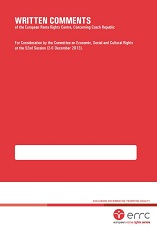
The European Roma Rights Centre (ERRC) submits this parallel report to the Human Rights Committee reporting country-specific information on issues affecting Roma in Serbia that raise questions under the Covenant on Civil and Political Rights (CCPR). The present report describes the current situation regarding serious human rights abuses of Roma in Serbia – school segregation, ethnic discrimination and lack of birth registration. The ERRC respectfully submits its written comments concerning Serbia for consideration by the Covenant on Civil and Political Rights (CCPR) at its Concluding Observations of the 119th Session, which will be held from 6 to 29 March 2017. The ERRC has undertaken regular monitoring of the human rights situation of Roma in Serbia and this report reflects the current priorities in our work in Serbia. According to current official estimates, Roma in Serbia make up approximately 2.05% of the total population or 147,604 Roma. This makes Roma the second largest minority after Hungarians. However, a verified and accurate count remains elusive. Unofficial sources suggest that the number of Roma in Serbia is significantly higher, ranging between 250,000 to 500,000. In addition to the autochthonous groups, an estimated to 50,000 Roma fled during and after the conflict in Kosovo to Serbia; only half of whom registered as internally displaced persons (IDPs). However, it is not known if all of them remained in Serbia or left for destinations in Western Europe. Furthermore, thousands of Roma have been returned to Serbia from Western European countries in the last years as failed asylum seekers; including Roma who were originally from Kosovo. Roma are the youngest ethnic group in Serbia. The average age is 27.5 years, compared to 40.2 years among the general Serbian population. According to UNICEF, the primary school completion rate for non-Roma children is 94.5% and the transition rate to secondary school is 96.5%, while for Roma children the primary school completion rate is considerably lower - 63%, while the numbers for secondary school for Roma youngsters is even lower - 55.5%. Illiteracy rates range between age groups from 13.7% amongst adolescents to 57.2% among the elderly. Romani women are extremely disadvantaged when it comes to education achievements; illiteracy is estimated to reach up to 80%.
More...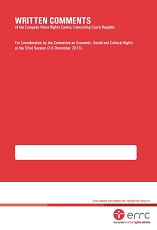
The European Roma Rights Centre (ERRC) and Praxis respectfully submit their written comments concerning Serbia for consideration by the Committee on the Rights of the Child (CRC) at its Concluding Observations of the 74th Session, which will be held from 16 January to 3 February 2017. The ERRC and Praxis have undertaken regular monitoring of the human rights situation of Roma in Serbia and this report reflects the current priorities in our work in Serbia. According to current official estimates, Roma in Serbia make up approximately 2.05% of the total population or 147,604 Roma. This makes Roma the second largest minority after Hungarians. However, a verified and accurate count remains elusive. Unofficial sources suggest that the number of Roma in Serbia is significantly higher, ranging between 250,000 to 500,000. In addition to the autochthonous groups, approximately 4,000 –50,000 Roma fled during and after the conflict in Kosovo to Serbia; only half of whom registered as internally displaced persons (IDPs). However, it is not known if all of them remained in Serbia or left for destinationsin Western Europe. Furthermore, thousands of Roma have been returned to Serbia from Western Europeancountries in the last years as failed asylum seekers; including Roma who were originally from Kosovo.Roma are the youngest ethnic group in Serbia. The average age is 27.5 years, compared to 40.2 years among the general Serbian population. According to UNICEF, the primary school completion rate for non-Roma children is 94.5% and the transition rate to secondary school is 96.5%, while for Roma children the primary school completion rate considerably lower - 63%, while the numbers for secondary school for Roma youngsters is even lower - 55.5%. Illiteracy rates range between age groups from 13.7% amongst adolescents to 57.2% among the elderly. Romani women are extremely disadvantaged when it comes to education achievements; illiteracy is estimated to reach up to 80%.
More...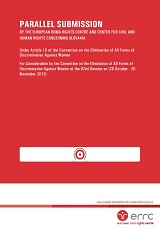
The Center for Civil and Human Rights (Poradňa pre občianske a ľudské práva, hereinafter also referred to as „Poradňa“) and the European Roma Rights Centre (hereinafter also referred to as “ERRC”) hereby jointly submit this report to the United Nations Committee on the Elimination of All Forms of Discrimination Against Women (CEDAW) commenting on the Combined Fifth and Six Periodic Report of Slovakia, submitted under Article 18 of the United Nations Convention on the Elimination of All Forms of Discrimination against Women (Convention). The present shadow report focuses on the issues disproportionately impacting Romani women: insufficient access of Romani women to justice in cases of their multiple discrimination, discrimination in education, health care and missing compensation and safeguard provisions for involuntary sterilisation of Romani women. The report describes the current situation regarding one of the most serious human rights abuses of women – the practice of coercive sterilisation of Romani women – and the legal, policy and other obstacles in reaching an effective remedy for the victims. The submission focuses only on issues directly related to the practice of coercive sterilisation; i.e. Articles 10 (equal access to education), 12 (equal access to health care services) and 16 (freedom from discrimination in all matters relating to marriage and family relations) of the Convention. This report aims to provide an update on the situation since 2008 when CEDAW last reviewed Slovakia. It includes an update on the legislative changes, compensation mechanism proposals, updates on court cases, comments on the information provided by the Slovak government and recommendations for government action. In its 2008 Concluding observations (CEDAW/C/SVK/CO/4), the Committee recommended Slovak government to developed specific measures to tackle discrimination against Romani women (discrimination of Romani women: paras 36 and 37, coercive sterilisation: paras 43 and 44). Submitting organizations are concerned that Slovakia has done little to address the Committee’s concerns and recommendations for the situation of Romani women and that progress in complying with the Convention on the Elimination of All Forms of Discrimination against Women is slow and insufficient.
More...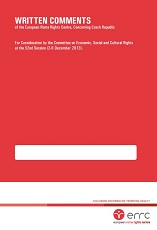
The Center for Civil and Human Rights (Poradňa pre občianske a ľudské práva, hereinafter also referred to as „Poradňa“) and the European Roma Rights Centre (hereinafter also referred to as “ERRC”) hereby jointly submit this report to the United Nations Committee on the Rights of the Child (hereinafter also referred to as “Committee”) for the consideration to the 72nd Pre-Sessional Working Group (05 Oct 2015 - 09 Oct 2015). The report focuses on issues disproportionately impacting Romani children in Slovakia including: - discriminatory legislation; - discrimination of Romani children in education; - sterilization of Romani girls without parental and informed consent; - segregation of Romani patients, including children, in hospitals; - adequate standard of living; - police ill-treatment and harassment; - Romani children in institutional care. In its 2007 Concluding observations (CRC/C/SVK/CO/2) , the Committee touched upon most of the abovementioned issues. The submitting organisations are concerned that Slovakia has done little to address the Committee’s concerns and recommendations and that progress in complying with the Convention on the Rights of the Child is slow and insufficient. Altogether more than 40 per cent of Roma in Slovakia live in segregated settings either outside of municipalities or on their peripheries. Many of those families live in substandard living conditions facing the threat of eviction. Residential segregation usually affects educational attainment and future employment possibilities. Discrimination against Romani children is twofold in education: they are overrepresented in special schools and classes for children with mild mental disabilities and also segregated in separate classrooms and schools within mainstream education. Romani children are also significantly overrepresented in State childcare institutions and disproportionally affected by the legislative framework regulating the social security system. In recent years, the submitting organisations have recorded a growing number of verbal and physically violent attacks and incidents of harassment committed by police against Roma, including minors, which have not been investigated effectively. Submitting organisations have also advocated for effective investigation of the practice of sterilization of Romani women and girls without parental and informed consent in Slovakia and adequate compensation for affected women and girls, which the Slovak Government fails to conduct.
More...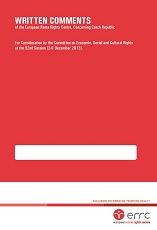
This joint written submission outlines key issues of concern with regard to the Czech Republic’s implementation of the Convention on the Elimination of All Forms of Racial Discrimination (hereinafter the “CERD Convention”). These key issues of concern are the following: a. general legal framework on discrimination; b. housing and adequate living conditions; c. inclusive education; d. ill-treatment and harassment; and e. involuntary sterilisations. 2. The purpose of this joint submission is to inform the Committee on the Elimination of Racial Discrimination (hereinafter the “Committee”) of legislation, policies and practices implemented bythe Czech Republic which violate the CERD Convention. We are also recommending the Committee to remind the State Party that, when acting upon the Committee’s recommendations, it has to take into consideration the entire body of UN human rights jurisprudence (rather than looking at separate treaty-based bodies) and respect all the obligations it has assumed by ratifying numerous UN human rights treaties. To this end we are providing, where relevant, information on the jurisprudence and practices of other UN human rights bodies. 3. This joint submission has been prepared by the European Roma Rights Centre (ERRC), the Mental Disability Advocacy Center (MDAC)2 and the Platform for Social Housing.
More...